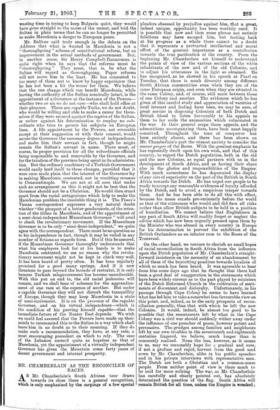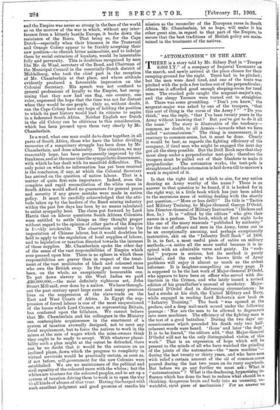ME. CHAMBERLAIN AS THE RECONCILER OF RACES.
A S Mr, Chamberlain's South African tour draws -DR- towards its close there is a general recognition, which is only emphasised by the earplugs of a few special pleaders obsessed by prejudice against him, that a great, indeed unique, opportunity has been worthily used. It is possible that now and then some phrase not entirely felicitous may have escaped him, but looking back at his progress as a whole there cannot be a doubt that it represents a protracted intellectual and moral effort of the greatest importance as a contribution towards the true pacification of the country. From the beginning Mr. Chamberlain set himself to understand the points of view of the various sections of the white inhabitants of the new and of the old Colonies, and to adjust his utterances in the light so obtained. He has recognised, as he showed in his speech at Paarl on Tuesday, that there is much diversity among different South African communities even when they are of the same European origin, and even when they are situated in the same Colony, and, of course, still more between those of one Colony and another. The evidences which he has given of this careful study and appreciation of varieties of local interest and feeling have been, we may be sure, of great service in disposing Colonists of both Dutch and British blood to listen favourably to his appeals to them to lay aside the animosities which culminated in the war. In their general scope those appeals, and the admonitions accompanying them, have been most happily conceived. Throughout the tone of conqueror has been entirely absent, and there has been shown on Mr. Chamberlain's part the utmost anxiety to consider the amour propre of the Boers. With the greatest emphasis he has repeatedly dwelt upon his own wish, and that of this country, to regard the Dutch population, both in the old and the new Colonies, as equal partners with us in the development of South Africa, and as having their share also in the glories and responsibilities of the Empire: With much earnestness he has deprecated the display of any airs of superiority on the part of the British in South Africa towards the Dutch. He has urged our people to be ready to accept any reasonable evidences of loyalty afforded by the Dutch, and to avoid a suspicious temper towards them. And he has been able to do all this with effect, because his name stands pm-eminently before the world as that of the statesman who would and did face all risks rather than allow British subjects to be held in a position of humiliation. We cannot believe that Englishmen in any part of South Africa will readily forget or neglect the advice which has now been urgently pressed upon them by the Minister who was abused in every country in Europe for his determination to prevent the exhibition of the British Outlanders as an inferior race to the Boers of the Transvaal.
On the other hand, we venture to cherish no small hopes of racial reconciliation in South Africa from the influence upon the Dutch population of Mr. Chamberlain's straight- forward insistence on the necessity of an abandonment by all of them of the boycotting practices towards loyalists of which so much has been heard. It was agreeable to hear from him some clays ago that he thought that there had been a good deal of exaggeration in the statements which have been widely current as to the part played by ministers of the Dutch Reformed Church in the cultivation of senti- ments of discontent and disloyalty. Unfortunately, in his passage through Cape Colony he seems to have learned what has led him to take a somewhat less favourable view on this point, and, indeed, as to the early prospects of recon- ciliation generally, than that with which he left the new Colonies. It would, indeed, be almost too good to be possible that the resentments left by what in the Cape Colony was a civil war should suddenly wither away under the influence of one preacher of peace, however potent and persuasive. The grudges among families and neighbours left by our own troubles in the seventeenth and eighteenth centuries lingered, we believe, much longer than is commonly realised. None the less, however, as it seems to us, may we reasonably hope for a gradual and sure, if not a profuse and rapid, harvest from the good seed sown by Mr. Chamberlain, alike in his public speeches and in his private interviews with representative men. The Dutch are both a Christian and a common-sense people. From neither point of view is there much to be said for mere sulking. The war, as Mr. Chamberlain has carefully and clearly pointed out, has absolutely determined the question of the flag. South Africa will remain British for all time, unless the Empire is wrecked; and the Empire was never so strong in thiface of the world as on the morrow of the war in which, without any inter- ference from a bitterly hostile Europe, it broke down the resistance of the Boers. That being so, for the Cape patch—especially when their kinsmen in the Transvaal and Orange Colony appear to be frankly accepting their new position—to cherish bitter animosities, and to indulge them by social ostracism of loyalists, would be lamentable folly and perversity. This is doubtless recognised by men like Mr. de Waal, secretary of the Bond, and Chairman of the Municipal Council in the essentially•Dutch district of Middelburg, who took the chief part in the reception of Mr. Chamberlain at that place, and whose attitude evidently produced a favourable impression on the Colonial Secretary. His speech was not confined to general professions of loyalty to the Empire, but recog- nising that they now had one flag, one country, one ruler, expressed the hope that the time was not far distant when they would be one people. Only so, without doubt, can the Cape Colony have any hope of holding the position to which its past history would lead its citizens to aspire in a federated South Africa. Neither English nor Dutch in the old Colony can be oblivious to this consideration, which has been pressed upon them very clearly by Mr. Chamberlain.
In a word, what one man could do to draw together, in all parts of South Africa, those who have the bitter dividing memories of a sanguinary struggle has been done by Mr. Chamberlain, and done admirably. The situation, we may reasonably hope, has been permanently improved by the frankness, and at the same time the sympathetic discernment, with which he has dealt with its manifold difficulties. The only point on which no information has yet • been received is the conclusion, if any, at which the Colonial Secretary has arrived on the question of native labour. That is a matter of quite first-rate importance. Indeed, even the . complete and rapid reconciliation of the white races in South Africa would afford no guarantees for general peace and security if any grave mistake were made in native policy. It must be candidly acknowledged that the atti- tude taken up by the leaders of the Rand mining industry within the past few days has been by no means calculated to enlist sympathy here. The claim put forward by Lord Harris that on labour questions South African Colonists were entitled to settle things as they thought proper without regard to the opinion of other parts of the Empire is fru.nkly intolerable. The observation related to the importation of Chinese labour, but it would doubtless be held to apply to' the regulation of local supplies of labour, and to legislation or taxation directed towards the increase of those supplies. Mr. Chamberlain spoke the other day of the sense of the vast responsibilities of Empire which ever pressed upon him. There is no sphere in which those responsibilities are graver than in respect of the treat- ment of the vast multitudes of black and coloured races who own the British sway. In the past our record has been, on the whole, an exceptionally honourable one. To put down slavery in the West Indies we paid .220,000,000,—the most definitely righteous act, John Stuart Mill said, ever done by a nation. We have through- out the past century spent large sums and many precious lives on the suppression of the slave-trade on the East and West Coasts of Africa. In Egypt the sup- pression of forced labour is one of the most unquestioned of the boons which Lord Cromer, as representing Britain, has conferred upon the fellaheen. We cannot believe that Mr. Chamberlain and his colleagues in the Ministry can contemplate acquiescence in the enactment of a system of taxation avowedly designed, not to meet any fiscal requirement, but to force the natives to work in the mines at the rate of wages which the mine-owners think they ought to be ready to accept. With whatever plausi- bility such a plan might at the outset be defended, there can be no doubt that it would be the entrance on an inclined plane, down which the progress to complicity in virtual servitude would be practically certain, as soon as, if not before, self-government for the new Colonies were established. We are no maintainers of the political and civil equality of the coloured races with the whites ; but the, whites are trustees for the coloured peoples, and to set up a' system of taxation driving them to work is to open the way to all kinds of abuses of that trust. Having discharged with: such excellent judgment and good promise of results his Mission as the 'reconciler of the European races in. South Africa, Mr. Chamberlain, let us hope, will make it his other great aim, in regard to that part of the Empire, to secure that the best traditions of British policy are main, tained in the treatment of the natives.











































 Previous page
Previous page